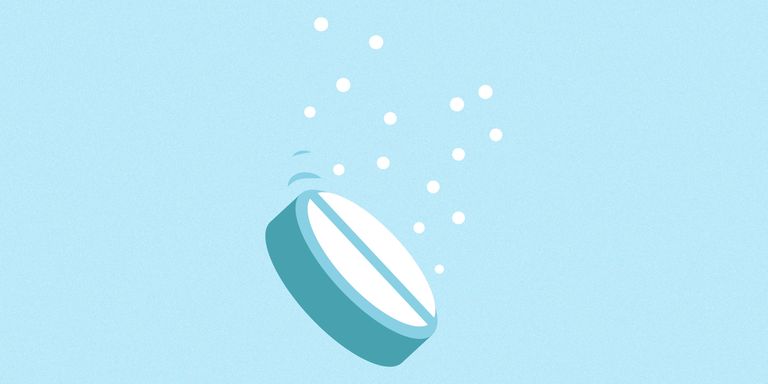
Maybe you ate way too much on your vacation last week. Maybe you haven’t been as *ahem* regular as you normally are. Maybe it’s just that time of the month. Whatever it is, you’re swollen and puffy and it’s super uncomfortable.
Sooo…should you just pop a few OTC water pills to help you ditch the bloat and feel normal again?
Hold on, what are water pills, anyway?
Water pills (a.k.a. diuretics) basically pressure your kidneys into flushing out excess water and salt through your pee.
There are actually three classes of diuretics that work in different ways, says Ellen Lunenfeld, M.D., an internist with Summit Medical Group in New Jersey—thiazide, loop-acting, and potassium-sparing diuretics. Each class works on a different part of the kidney’s “loop of Henle” where urine is made, says Lunenfeld.
They sound pretty harmless, right? After all, you’re just peeing more.
Actually, it goes a little deeper than that. Here’s what you need to know about water pills—and why you should definitely skip self-prescribing them.
1. Water pills are one of the most commonly prescribed medications.
Take note of that word: prescribed. Water pills are meant to help reduce blood pressure, prevent fluid buildup, and reduce swelling respectively, says Linda Anegawa, M.D., an internist at Pali Momi Medical Center in Hawaii.
They’re usually given to people with health issues like hypertension, heart failure, and idiopathic edema (unexplained swelling)—not people looking to cure mild bloating or lose weight. Most doctors recommend against using water pills for those purposes.
2. OTC water pills are different from prescription water pills.
It might be tempting to pick up an OTC water pill at the drugstore if you’re experiencing mild bloating, but Lunenfeld warns against this. That’s because OTC water pills and prescriptions water pills aren’t the same thing.
“The problem with OTC meds like these is that you’re not sure exactly what they’re giving you,” she explains. “They’re not FDA controlled, so they may not be doing what they claim to and in fact might be making you dehydrated.” (With an Rx, a doctor will monitor your dosage and length of use—that doesn’t happen with OTC water pills, hence the dehydration risk.)
Going a step further, OTC water pills could even be toxic and interact badly with other medicines you’re taking, says Anegawa. (Again, with a prescription, a doctor will be monitoring this.) OTC water pills also haven’t been studied in research trials to prove their efficacy, she adds.
3. Water pills aren’t addictive, but they can be dangerous.
Water pills aren’t habit-forming or dangerous, says Anegawa—again, as long as you’re getting them through your doctor. When you start taking them on your own without a recommended dosage, however, you could do some serious damage to your body.
“[Taking them] can cause worsening kidney function, and lightheadedness or dizziness as a result of being dehydrated,” says Lunenfeld. Other scary symptoms caused by dehydration and loss of electrolytes includes heart palpitations, weakness, confusion, and severe dizziness.
3. They don’t really help you lose weight…
Sure, water pills help you shed excess water that’s making you feel super bloated—but only temporarily. Once you stop taking them, your kidneys go back to reabsorbing the normal amount of water and salt for your body, so you’ll go back to your typical body weight soon after you stop taking them.
“When you’re weighing yourself, [you’re adding up] bone, fat, muscle and water,” says Lunenfeld. “When you’re looking to lose weight, you’re looking to lose fat and maintain muscle mass. With a diuretic, you’re just losing water weight, which isn’t really getting you any significant weight loss.”
4. In fact, they might make you gain weight.
Yep, you read that right. If you take any type of diuretic over a long period of time, your kidneys will eventually compensate for their use and you’ll end up holding on to more water weight than you did before you started taking them.
It’s called diuretic-induced edema, which happens when your kidneys start retaining more sodium and water than they need and your body starts to swell, says Anegawa—kind of the opposite of what a water pill is supposed to do.
5. Prescriptions water pills can be helpful if you’re on your period.
While it’s not recommended for healthy women to take any kind of water pills, there is one exception: to reduce period bloating. According to Anegawa, it’s fine for women to take prescription water pills to help de-puff unexplained leg swelling or bloating caused by PMS, says Anegawa.
Again, that’s prescription-only, so don’t head to your nearest drugstore for diuretics. Instead, bring up the issue to your ob-gyn, who may prescribe water pills to take before your period or whenever you tend to feel super-inflated. Since your physician will be keeping an eye on your dose, you’ll reduce your risk of serious side effects and have someone to call if something feels off.
Source: Read Full Article